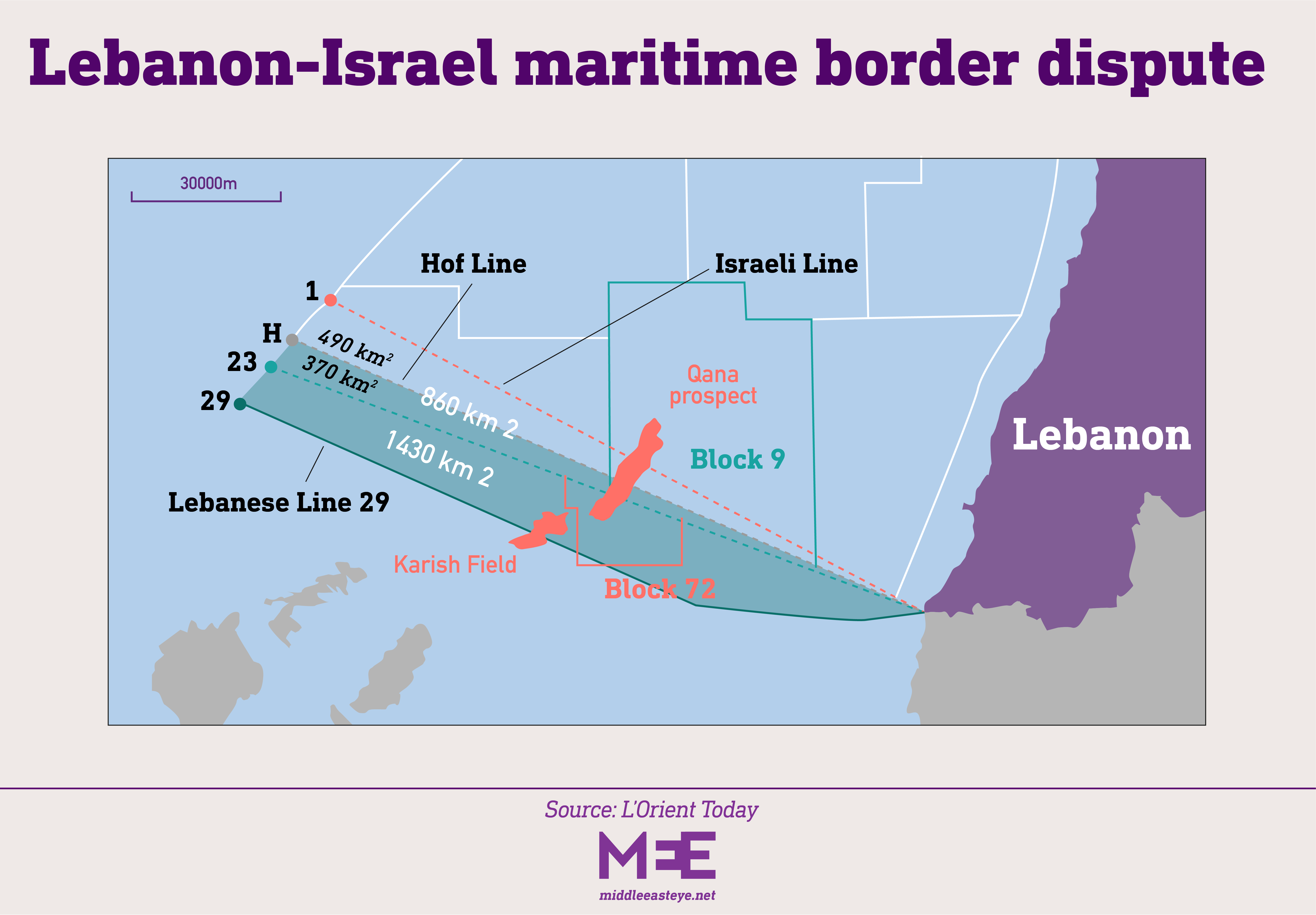Israel and Lebanon officially sign 'historic' maritime border deal
Lebanon and Israel signed a maritime border agreement on Thursday, paving the way for lucrative offshore gas extraction by the neighbours, which remain technically at war.
The US-brokered deal, hailed by President Joe Biden as a "historic breakthrough", comes as western powers clamour to open up new gas production and reduce vulnerability to supply cuts from Russia.
A letter approving the deal was first signed by Lebanese President Michel Aoun in Beirut and then by Israeli Prime Minister Yair Lapid in Jerusalem.
Lapid claimed that Lebanon's signing of the deal amounted to a de-facto recognition of Israel.
"It is not every day that an enemy state recognises the state of Israel, in a written agreement, in front of the entire international community," he said, shortly before a special cabinet meeting in which the deal was signed.
Stay informed with MEE's newsletters
Sign up to get the latest alerts, insights and analysis, starting with Turkey Unpacked
In a palace statement after he signed the agreement, Aoun said the deal would have "no political dimensions or impacts that contradict Lebanon's foreign policy."
Speaking from the presidential palace, Lebanon's top negotiator and deputy prime minister Elias Bou Saab said the agreement marked the beginning of "a new era".
A letter exchange is due to take place later in Naqura, southern Lebanon, in the presence of US mediator Amos Hochstein and the UN's special coordinator for Lebanon Joanna Wronecka.
'[The Lebanese delegation] will not... meet the Israeli delegation'
- Rafic Chelala, Lebanese presidency spokesman
"The agreement... will take the form of two exchanges of letters, one between Lebanon and the United States, and one between Israel and the United States," said Stephane Dujarric, spokesman for the UN Secretary General.
Lebanon, which has fought a series of wars with Israel, said it would not allow its delegation to be in the same room as the Israeli side, and the two parties would not even sign the same piece of paper.
Rafic Chelala, a spokesman for the Lebanese presidency, confirmed that the Lebanese delegation "will not... meet the Israeli delegation".
The deal comes as Lebanon seeks to extract itself from what the World Bank calls one of the worst economic crises in modern world history, and as Lapid seeks to lock in a major achievement days ahead of a general election on 1 November.
Hochstein said on Thursday that he expected the agreement to hold even amid changes in leadership in both countries.
The US mediator was referring to both the upcoming Israeli elections and the end of Aoun's term on 31 October, saying the agreement should be kept up "regardless of who is elected very soon as next president of Lebanon".
No quick returns
Israel on Tuesday gave London-based company Energean permission to begin producing gas from Karish, an offshore field at the heart of the border agreement.
Lebanon meanwhile will have full rights to operate and explore the so-called Qana or Sidon reservoir, parts of which fall in Israel's territorial waters, with Israel receiving some of the revenues.
With the demand for gas rising worldwide because of an energy crisis sparked by Russia's invasion of Ukraine, Lebanon hopes that an offshore discovery would ease its financial and economic crisis.
But analysts caution that it will take time for production to start in Lebanese waters, meaning no quick returns for a country that is desperately short of foreign exchange reserves.
Exploration has so far only been tentative. A 2012 seismic study of a limited offshore area by the British firm Spectrum estimated recoverable gas reserves in Lebanon at 25.4 trillion cubic feet, although authorities in Lebanon have announced higher estimates.
The deal could not have been signed without the consent of the Lebanese movement Hezbollah, which threatened over the summer to attack Israel if it began extracting gas from the Karish field before reaching an agreement.
Lapid said on Thursday that the deal "strengthens and fortifies Israel's security and freedom of action against Hezbollah and the threats from the north".
Middle East Eye delivers independent and unrivalled coverage and analysis of the Middle East, North Africa and beyond. To learn more about republishing this content and the associated fees, please fill out this form. More about MEE can be found here.





